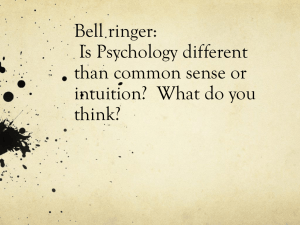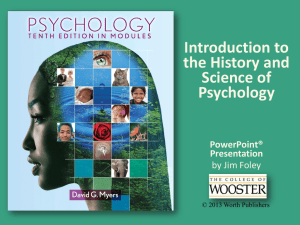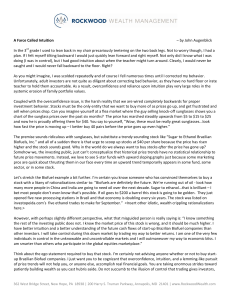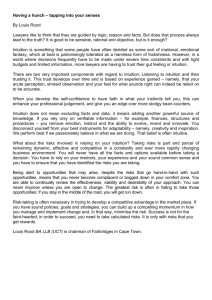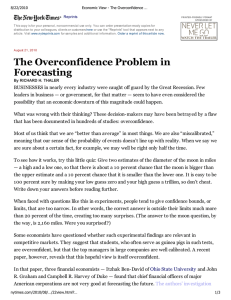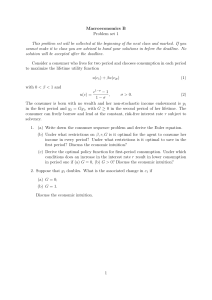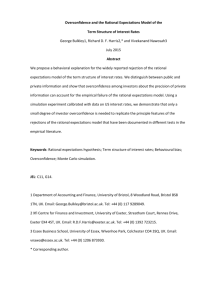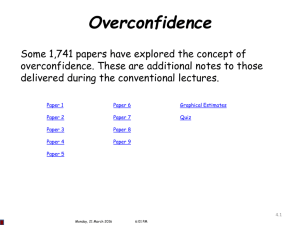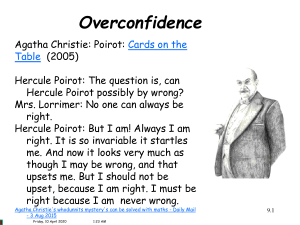Chapter 1: Thinking critically with psychological science
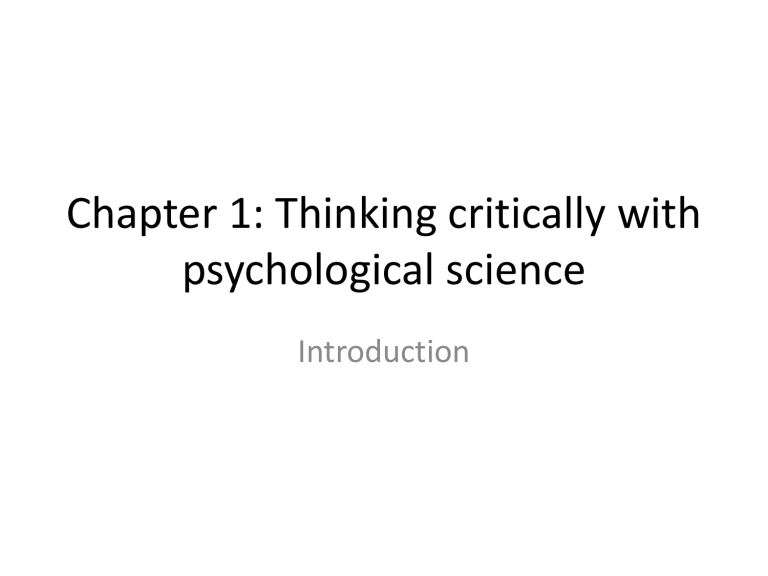
Chapter 1: Thinking critically with psychological science
Introduction
Fact or Falsehood
1. Human intuition is remarkable accurate and free from error.
2. Most people seem to lack confidence in the accuracy of their beliefs.
3. Case studies are particularly useful because of the similarities we all share.
4. We tend to overestimate the number of people who share our attitudes and beliefs.
5. The opinions of 1500 randomly selected people can provide a very accurate picture of the opinions of an entire nation.
Fact or Falsehood
6. The scientific finding that children who watch violence on television tend to be violent proves that viewing violence causes it.
7. Listening to a tape with a subliminal message suggesting that you have a good memory can actually help improve your memory.
8. The purpose of the experiment is to re-create behaviors exactly as they occur in everyday life.
9. An analysis of the research indicates that psychologists have sometimes unnecessarily caused extreme pain to animals.
10. As a science, psychology is objective and value-free.
Fact or Falsehood
• Now at the top of your paper, predict how many you think you got correct.
Fact or Falsehood
1. Human intuition is remarkable accurate and free from error.
2. Most people seem to lack confidence in the accuracy of their beliefs.
3. Case studies are particularly useful because of the similarities we all share.
4. We tend to overestimate the number of people who share our attitudes and beliefs.
5. The opinions of 1500 randomly selected people can provide a very accurate picture of the opinions of an entire nation.
Fact or Falsehood
6. The scientific finding that children who watch violence on television tend to be violent proves that viewing violence causes it.
7. Listening to a tape with a subliminal message suggesting that you have a good memory can actually help improve your memory.
False
8. The purpose of the experiment is to re-create behaviors exactly as they occur in everyday life.
False
9. An analysis of the research indicates that psychologists have sometimes unnecessarily caused extreme pain to animals.
False
10. As a science, psychology is objective and value-free.
False
Understanding Research
DISCOVERING PSYCHOLOGY
Why do we have to learn this stuff?
Psychology is first and foremost a science.
Thus it is based in research.
Before we delve into how to do research, you should be aware of three hurdles that tend to skew our logic.
Hindsight Bias
• The tendency to believe, after learning the outcome, that you knew it all along.
I KNEW IT ALL ALONG
Overconfidence
• We tend to think we know more than we do
.
• 82% of U.S. drivers consider themselves to be in the top 30% of their group in terms of safety.
• 81% of new business owners felt they had an excellent chance of their businesses succeeding. When asked about the success of their peers, the answer was only 39%.
(Now that's overconfidence!!!)
Overconfidence
• Here are some examples of overconfidence among experts.
• There is no reason for anyone to have a computer in their home.
(Ken Olsen, president of Digital Equipment Company, 1977)
• Heavier-than-air flying machines are impossible. (Lord Kelvin,
British mathematician, physicist, and president of the British Royal
Society, 1895)
• A severe depression like that of 1920-21 is outside the range of probability. (Harvard Economic Society, Weekly Letter, November
16, 1929)
• Man will never reach the moon, regardless of all future scientific advances. (Lee DeForest, inventor of the vacuum tube, 1957)
• Nuclear powered vacuum cleaner will probably be a reality within
10 years. (Alex Lewyt, manufactures of vacuum cleaners, 1955)
Overconfidence
• Compare your score to your predicted score.
– By raise of hands, how many over predicted your score?
• Overconfidence is a powerful phenomenon.
• Overconfidence stems partly from our tendency to search for information that confirms our preconceptions.
The Barnum Effect
• It is the tendency for people to accept very general or vague characterizations of themselves and take them to be accurate.
Impression of Psychology
With hopes of satisfying curiosity, many people listen to talk-radio counselors and psychics to learn about others and themselves.
Dr. Crane (radio-shrink) Psychic (Ball gazing)
Demonstration
• Glass of water and paperclips.
• The limits of Intuition and Common Sense
– Counter to human intuition, water has a high surface tension, behaving as though is has a flexible skin. That skin pulls inward and resists breaking. The glass of water will develop a great bulge before the water flows over the edge.
Thinking Critically with Psychological
Science
The Need for Psychological Science
The limits of Intuition and Common Sense
Many people believe that intuition and common sense are enough to bring forth answers regarding human nature.
Intuition and common sense may aid queries, but they are not free of error.
The Scientific Attitude
The Scientific Method
Scientific Attitude
• How do we overcome the limits of our intuition, hindsight bias, and overconfidence?
• The scientific attitude is composed of curiosity
(passion for exploration), skepticism (doubting and questioning) and humility (ability to accept responsibility when wrong).
The Need for Psychological Science
The Amazing Randi--Skeptic
Critical Thinking
thinking that does not blindly accept arguments and conclusions
examines assumptions
discerns hidden values
evaluates evidence
Ch 1: thinking critically with psychological science
Research Methods
Applied V. Basic Research
• Applied Research has clear, practical applications.
• YOU CAN USE IT!!!
• Basic Research explores questions that you may be curious about, but not intended to be immediately used.
Studying how kissing changes when you get older is interesting…but that’s about it.
Terminology
Theory
A Theory is an explanation that integrates principles and organizes and predicts behavior or events.
For example, low self-esteem contributes to depression.
Hypothesis
BOOK
A Hypothesis is a testable prediction, often prompted by a theory, to enable us to accept, reject or revise the theory.
• Expresses a relationship between two variables.
• A variable is anything that can vary among participants in a study.
• Participating in class leads to better grades than not participating.
People with low self-esteem are apt to feel more depressed.
Experimental Method
• Looking to prove causal relationships.
• Cause = Effect
• Laboratory v. Field
Experiments
Smoking causes health issues.
Independent Variable
• Whatever is being manipulated in the experiment.
• Hopefully the independent variable brings about change.
If there is a drug in an experiment, the drug is almost always the independent variable.
Dependent Variable
• Whatever is being measured in the experiment.
• It is dependent on the independent variable.
The dependent variable would be the effect of the drug.
Operational Definitions
• Explain what you mean in your hypothesis.
• How will the variables be measured in “real life” terms.
• How you operationalize the variables will tell us if the study is valid and reliable.
Let’s say your hypothesis is that chocolate causes violent behavior.
• What do you mean by chocolate?
• What do you mean by violent behavior?
Sampling
• Identify the population you want to study.
• The sample must be representative of the population you want to study.
• GET A RANDOM
SAMPLE.
Beware of Confounding Variables
If I wanted to prove that smoking causes heart issues, what are some confounding variables?
• The object of an experiment is to prove that A causes B.
• A confounding variable is anything that could cause change in B, that is not A.
Lifestyle and family history may also effect the heart.
Random Assignment
• Once you have a random sample, randomly assigning them into two groups helps control for confounding variables.
• Experimental Group v.
Control Group.
• Group Matching
Hawthorne Effect
• But even the control group may experience changes.
• Just the fact that you know you are in an experiment can cause change.
Whether the lights were brighter or dimmer, production went up in the
Hawthorne electric plant.
Experimenter Bias
• Another confounding variable.
• Not a conscious act.
• Double-Blind
Procedure.
Other Confounding Variables
• Placebo effect
• Order Effects
Participant Bias
• Tendency of research subjects to respond in certain ways because they know they are being observed
• The subjects might try to behave in ways they believe the researcher wants them to behave
• Can be reduced by naturalistic observation
